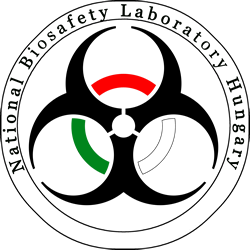
Description of the RI
The National Biosafety Laboratory (NBL) at the National Public Health Center is the only licensed highest level biosafety laboratory (BSL) established for public health purposes in Central Europe. The NBL consists of two independently operating units: a BSL3+ laboratory with two rooms for the works with Risk Group 3 (RG3) pathogens (SARS-CoV-2, anthrax, dengue virus) and a positive pressurized suit BSL-4 laboratory with three rooms, including an animal room, for the works with RG-4 pathogens (e.g. Ebola virus, Nipah virus). NBL is also authorized to work with GMOs on BSL-3/4. NBL is the Hungarian node of the European Research Infrastructure on Highly Pathogenic Agents (ERINHA).
ERINHA is a pan-European distributed Research Infrastructure dedicated to the study of high-consequence emerging and re-emerging pathogens. It brings together leading BSL-4 and complementary (e.g. BSL3) facilities with longstanding experience of research in the field of highly infectious diseases. The over-arching goal of ERINHA is to provide capacities to conduct projects which are broad in scope, ambition and require a range of capabilities that no single facility or even country can provide on its own.
Activities and Services
NBL applies wide range of microbiological methods ranging from classical methods (virus/bacteria isolation on cell culture and animals, biochemical identification tests, antibiotic susceptibility testing, etc.), serological tests (ELISA, immunofluorescence methods and their development, neutralization methods), and molecular methods (PCR, whole genome sequencing). NBL maintains viral and bacterial cell culture collections, performs diagnostic/differential diagnostic tests, provides access to its specialized BSL-3+ and BSL-4 laboratories, gives biosecurity and biosafety advices, and offers trainings for future users at BSL-3 and BSL-4.
Services in the field of research and development of dangerous pathogens:
- Whole genome sequencing (on Illumina and Oxford Nanopore platform using sequence dependent and independent methods)
- Animal experiments on mice, hamsters, rats in pre-clinical studies (Proof-of-Concept), challenge studies, immunological studies (immune-pathomechanism studies)
- Antimicrobial and disinfectant testing (in-vivo and in-vitro systems)
- Testing of new diagnostic tools
In addition to standard laboratory equipment, a wide range of equipment is available to perform these tasks: biocontainment IVC cages, ultracentrifuge, inverted fluorescence microscopy (Leica DMi8, Nikon TS2R), ELISA systems, MiSEQ and Nanopore sequencers, Luminex MagPix.
Single sited
National Public Health Center
Budapest
Fully operational, 2018-
- Eötvös Loránd University (ELTE)
- Semmelweis University (SE)
- University of Pécs (PTE)
- Eötvös Loránd Research Network (ELKH)
- University of Veterinary Medicine (ÁOTE)
INTERNATIONAL COLLABORATION
With RIs
- ERINHA (European Research Infrastructure on Highly Pathogenic Agents)
- EVD-Labnet (Emerging Viral Diseases-Expert Laboratory Network)
- EMLab (European Mobile Laboratory)
Institutional partners
- ERINHA
- Bernhard Nocht Institute for Tropical Medicine
- INMI Lazzaro Spallanzani Istituto Nazionale Malattie Infettive
- Robert Koch Institute
- ECDC
- WHO
- University of Tokyo







